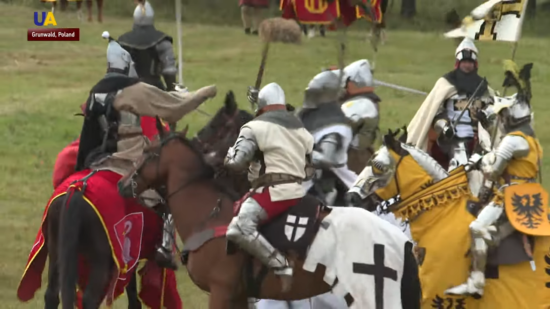The leader of the Teutonic Order Grandmaster Ulrich von Jungingen and the King of Poland Władysław II Jagiełło with Lithuanian Grand Duke Vytautas are giving their men the order to advance. Bows and cannons are used to batter the enemy before engaging in hand to hand combat.
About a thousand reenactors were on the battlefield. The cavalry, infantry, archers and artillerymen are all dressed in medieval costumes, with armor and banners.
Over 30,000 spectators watched the battle. Behind the scenes were another 5,000 people who helped prepare for the reenactment. They played the role of villagers and guards, or squires, as did Mikhal Serduszak.
“When tourists try to trespass I tell them that they are not allowed. When they ask why I tell them it is not allowed and show them this sharp pike and tell them exactly where to go,” he said.

All of the reenactors got prepared at the site of the battle, fixing their armor and suits and polishing their big swords. The food offered to all willing was made according to 15th-century recipes.
Tourists were also treated to traditional dishes. And at the thematic fair folk art items were sold like pottery, clothes from the time of the Battle of Grunwald, elements of military equipment, as well as stylized medieval decorations.
We came here for the first time. It was beautiful. We will probably come back next year,” tourist Mykhailo Rahulin said.
“What really struck me is the scale of the battle. I never expected such numbers,” tourist Romuald Kossakovsky said.
Just like 609 years ago, the Polish-Lithuanian Commonwealth troops defeated the Teutons. At the end of the battle, the body of the grandmaster of the Teutonic Order Ulrich von Jungingen, who had been killed, was carried out to the middle of the battlefield.
These events occurred during the war of 1409-1411 between the Teutons on the one hand and the combined forces of the Polish kingdom and the Grand Duchy of Lithuania. According to historians’ estimates, 39,000 soldiers as part of the Polish-Lithuanian troops came together on the battlefield, and 27,000 came from the Teutonic Order in a brutal three hours of bloodshed.












